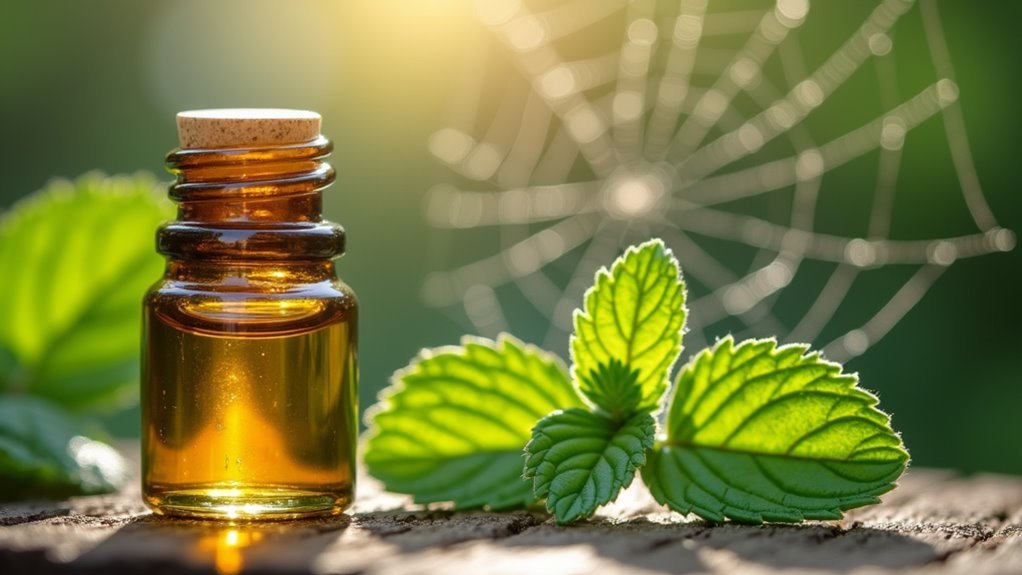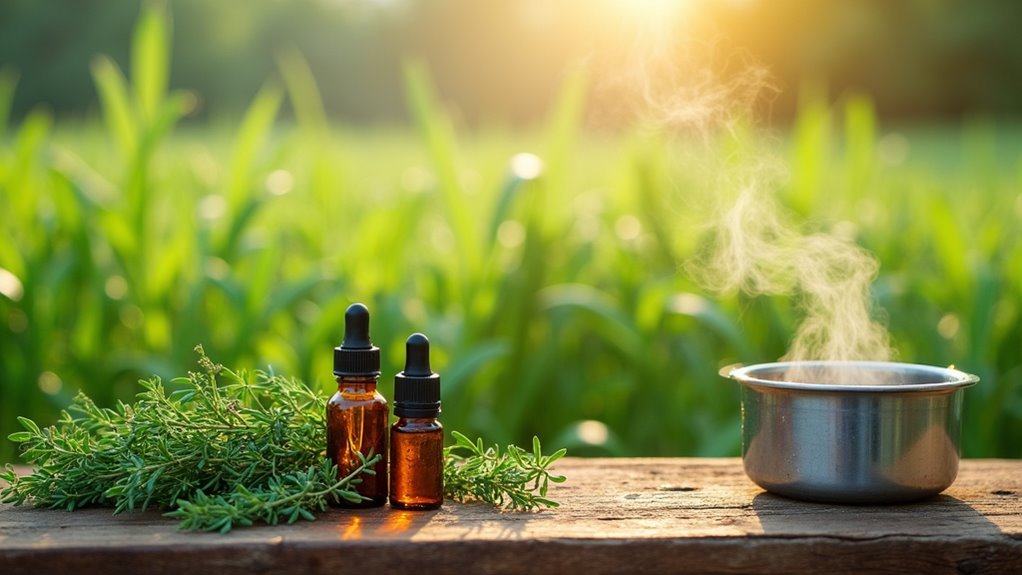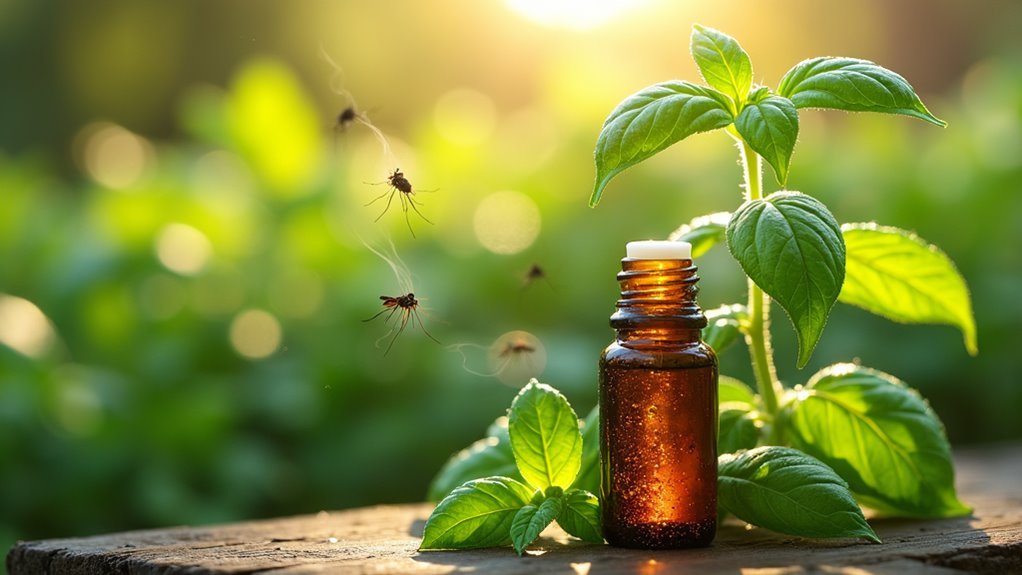You can effectively repel spiders using nine powerful essential oils that disrupt their sensory organs. Peppermint and tea tree oils create strong odors spiders can’t tolerate, while lavender and eucalyptus oils establish unwelcoming environments. Citrus oils offer fresh scents with deterrent properties, and thyme oil forms effective barriers around entry points. Cedarwood and horse chestnut oils provide natural alternatives to chemicals, while sandalwood offers luxurious pest control. These oils work best when mixed with water and applied regularly to corners, baseboards, and entry areas where extensive strategies maximize your success.
Peppermint Oil

Peppermint oil stands out as one of the most effective natural spider deterrents available to homeowners. This powerful essential oil contains monoterpenoids that create a strong smell spiders can’t tolerate.
Peppermint oil’s monoterpenoids create an intolerable scent barrier that effectively drives spiders away from treated areas.
The menthol aroma disrupts their sensory organs, making navigation difficult and encouraging them to relocate elsewhere.
You’ll find peppermint oil among the most effective essential oils for spider control. Create your natural spider repellent by mixing several drops with water in a spray bottle.
Apply this solution to corners, baseboards, and entry points where spiders typically enter your home.
For best results, reapply weekly for minor infestations or more frequently for severe cases.
Remember that individuals with G6PD deficiency should avoid peppermint oil, and monitor pets for adverse reactions.
Tea Tree Oil
Tea tree oil delivers another powerful weapon in your natural repellent arsenal against spiders. This essential oil’s potent antiseptic and antifungal properties make it incredibly effective for pest control.
You’ll find its strong aroma acts as an excellent deterrent that spiders can’t stand.
Mix tea tree oil with water in a spray bottle and apply it to areas where spiders commonly gather. This natural repellent doesn’t just repel spiders directly – it also suppresses parasites like fleas and ticks that serve as spider food sources.
You can use it in diffusers too, creating an additional protective barrier while keeping your home fresh-scented.
However, exercise caution around pets, as tea tree oil can be toxic to cats and dogs if ingested or contacted.
Lavender Oil

While lavender oil creates a soothing atmosphere you’ll love, spiders absolutely despise its floral fragrance. This essential oil works as an effective repellent by targeting insects that spiders hunt for food, disrupting their food chain and forcing them to relocate elsewhere.
Lavender oil’s floral scent creates a welcoming atmosphere for humans while effectively repelling spiders who detest this natural fragrance.
You can use lavender oil in multiple ways for deterring spiders. Create scented sachets to place in closets and drawers, or mix the oil with water to make a spray solution. The pleasant aroma enhances your home’s ambiance while simultaneously keeping unwanted arachnids at bay.
Focus your application on strategic locations like entry points, under furniture, and dark corners where spiders typically hide.
Though research specifically on spiders remains limited, lavender oil’s proven insect-repelling properties make it valuable for extensive pest management.
Eucalyptus Oil
You’ll find eucalyptus oil’s crisp, clean scent creates an unwelcoming environment for spiders while freshening your home naturally.
Mix several drops with water in a spray bottle and apply it around windowsills, doorframes, and other entry points where spiders typically enter.
This invigorating oil doesn’t just repel these unwanted guests—it transforms your living space with its revitalizing aroma.
Fresh Scent Repels Spiders
When you’re searching for a natural spider deterrent that doubles as an air freshener, eucalyptus oil delivers both benefits with its crisp, invigorating scent.
This essential oil’s fresh, clean aroma naturally deters spiders and other insects from entering your home. While specific research on eucalyptus oil’s effectiveness against spiders remains limited, its potent fragrance successfully repels various pests.
You’ll want to mix eucalyptus oil with water and spray it around entry points, windows, and corners where spiders commonly appear.
The revitalizing scent enhances your indoor air quality while creating an unwelcoming environment for unwanted arachnids. For best results, reapply your eucalyptus oil solution regularly, especially after heavy rain, to maintain its spider-repelling properties throughout your living spaces.
Application Around Entry Points
Strategic placement of eucalyptus oil around your home’s entry points creates an effective barrier that spiders won’t cross. This essential oil’s potent scent effectively disrupts spiders’ navigation, making it an excellent natural solution for repelling spiders from your living space.
For proper application, follow these essential steps:
- Mix a few drops of eucalyptus oil with water in a spray bottle, ensuring proper dilution ratios.
- Apply the solution generously around windows, doors, and other potential entry points where spiders commonly enter.
- Reapply regularly as the scent’s potency diminishes over time, especially in outdoor conditions.
Remember to follow safety guidelines during application, particularly if you have pets.
The fresh, invigorating aroma not only deters unwanted arachnids but also enhances your home’s ambiance with its clean, rejuvenating scent.
Citrus Oils

Among the most accessible essential oils for spider control, citrus oils offer a dual benefit that makes them particularly appealing to homeowners.
You’ll find that lemon oil and other citrus oils provide fresh, pleasant scents while potentially deterring spiders from your living spaces. While studies show lemon oil doesn’t directly repel certain spider species, it enhances other essential oils’ effectiveness in repelling spiders.
You can create your own DIY spider repellent by mixing 10-15 drops of citrus oils per ounce of water with a dispersing agent.
These spider repellents work best when you apply them regularly around areas where spiders might enter or hide, creating an effective barrier while maintaining a brighter, cleaner atmosphere throughout your home.
Clove Oil
Clove oil delivers one of the most potent natural defenses against spider intrusions, thanks to its exceptionally strong aroma that overwhelms these pests’ sensitive sensory systems.
This powerful essential oil contains eugenol, an active compound with proven insecticidal properties that makes it an exceptional natural pest deterrent for repelling spiders.
You can create an effective DIY spider repellent by mixing clove oil with water and a dispersing agent.
The benefits include:
- Strong repellent action against various insects and spiders
- Pleasant fragrance that enhances your home’s environment
- Natural alternative to chemical pesticides
While clove oil shows promising results against multiple pests, specific research on spider repellency remains limited.
However, its potent aroma and proven insecticidal compounds make it a valuable addition to your essential oils arsenal.
Thyme Oil
You’ll find thyme oil’s repellent properties particularly effective against spiders due to compounds that disrupt their sensory organs.
The oil has shown success against related arachnids like mites and ticks, suggesting it’s a promising natural deterrent for your spider problems.
You can easily apply thyme oil indoors through DIY sprays or diffusers, making it a practical addition to your pest control routine.
Thyme’s Repellent Properties
While specific clinical testing on spiders remains limited, thyme oil has demonstrated impressive repellent activity against various pests, including mites and ticks, suggesting it’s a promising natural spider deterrent.
Natural compounds derived from Thymus vulgaris exhibit strong repellent properties, making this essential oil an effective addition to your pest management arsenal.
You can harness thyme oil’s spider repellent capabilities through these proven methods:
- DIY spray preparation: Mix 10-15 drops of thyme oil per ounce of water with a dispersing agent
- Strategic application: Target areas where spiders typically gather or enter your home
- Integrated approach: Combine with other natural repellents for thorough pest control
Using thyme oil strategically throughout your home creates an effective barrier against spiders while maintaining a completely natural pest management strategy.
Application Methods Indoors
Now that you understand thyme oil’s repellent properties, let’s explore how to apply it effectively throughout your indoor spaces.
Mix 10 to 15 drops of thyme oil with water in a spray bottle for ideal results. Target corners, entry points, and areas where spiders frequently appear. The strong scent disrupts spiders’ sensory organs, creating an effective barrier.
Regular application is essential for maintaining effectiveness, especially in high-traffic spider zones. Focus on basements, attics, and dark spaces where these pests typically hide.
For enhanced results, combine thyme oil with other essential oils like peppermint oil or tea tree oil. These application methods create a thorough defense system for repelling spiders throughout your home while maintaining a natural, chemical-free approach.
Cedarwood Oil
Cedarwood oil’s potent woody aroma makes it a formidable natural weapon against spiders seeking entry into your home. This essential oil’s insecticidal properties create an effective natural barrier that spiders actively avoid.
Cedarwood oil’s powerful woody scent creates an effective natural barrier that repels spiders from entering your home.
You’ll find it’s a safer alternative for pest control compared to synthetic chemicals.
Create your own DIY spider repellent by mixing cedarwood oil with water:
- Mix 10-15 drops per ounce of water with a dispersing agent
- Apply directly to windowsills, door frames, and entry points
- Reapply weekly or after cleaning for continued effectiveness
Beyond its spider repellent capabilities, cedarwood oil enhances your home’s ambiance with its pleasant woody scent.
You’re not just protecting your space from unwanted arachnids—you’re creating a naturally fragrant environment that’s both functional and inviting.
Horse Chestnut Oil
Horse chestnut oil emerges as an underappreciated yet scientifically-backed solution for spider control in your home. This lesser-known essential oil has proven effective at repelling various spider species through its natural compounds that disrupt spiders’ sensory receptors.
You’ll find it makes environments less inviting for these eight-legged intruders. You can use horse chestnut oil just like other popular essential oils such as peppermint. Simply mix it with water and apply the solution in areas where spiders typically enter your home.
This natural approach provides a safer alternative to synthetic pesticides while maintaining effectiveness. Consider incorporating horse chestnut oil into your existing repellent blends to enhance their spider-deterring properties and create a more thorough natural pest control strategy.
Sandalwood Oil
Sandalwood oil offers a uniquely aromatic approach to spider control that combines effective pest deterrence with a luxurious scent profile.
You’ll find this essential oil particularly valuable for repelling spiders while creating a calming atmosphere in your home. Though clinical testing specifically against spiders remains limited, sandalwood oil has demonstrated promising results in reducing mite egg-laying, suggesting similar deterring properties against arachnids.
You can implement sandalwood oil for spider control through several methods:
- Mix with water and a dispersing agent in a spray bottle for targeted application
- Incorporate into cleaning products for dual-purpose spider deterrence and fresh scenting
- Apply in areas prone to spider activity as part of a broader pest management strategy
This natural approach helps you maintain spider-free spaces while enjoying sandalwood’s distinctive fragrance.
Frequently Asked Questions
What Is the Best Essential Oil to Keep Spiders Away?
You’ll find peppermint oil’s the most effective choice for repelling spiders. Its strong menthol scent disrupts their sensory organs, making it scientifically proven as the top essential oil for keeping these arachnids away from your home.
What Smell Do Spiders Hate the Most?
Spiders hate strong, pungent smells that overwhelm their sensitive chemical receptors. You’ll find they’re most repelled by menthol, citrus, and minty scents, which disrupt their ability to navigate and hunt effectively in your space.
How Long Does Peppermint Oil Really Repel Spiders?
Peppermint oil’s spider-repelling effects last about one week indoors with minor infestations. You’ll need to reapply more frequently outdoors, especially after rain, since weather conditions reduce the oil’s potency and effectiveness.
What Will Spiders Not Cross?
You’ll find spiders won’t cross barriers treated with strong essential oils like peppermint or lavender. They’ll also avoid surfaces with citrus peels, vinegar solutions, or areas near aromatic plants like basil and thyme.
In Summary
You’ve now got ten powerful essential oils that’ll help keep spiders at bay without using harsh chemicals. Remember to dilute these oils properly and reapply them regularly for the best results. Test each oil in a small area first to verify you’re not sensitive to any scents. With consistent use, you’ll create a natural barrier that spiders won’t want to cross, giving you a spider-free home the natural way.





Leave a Reply